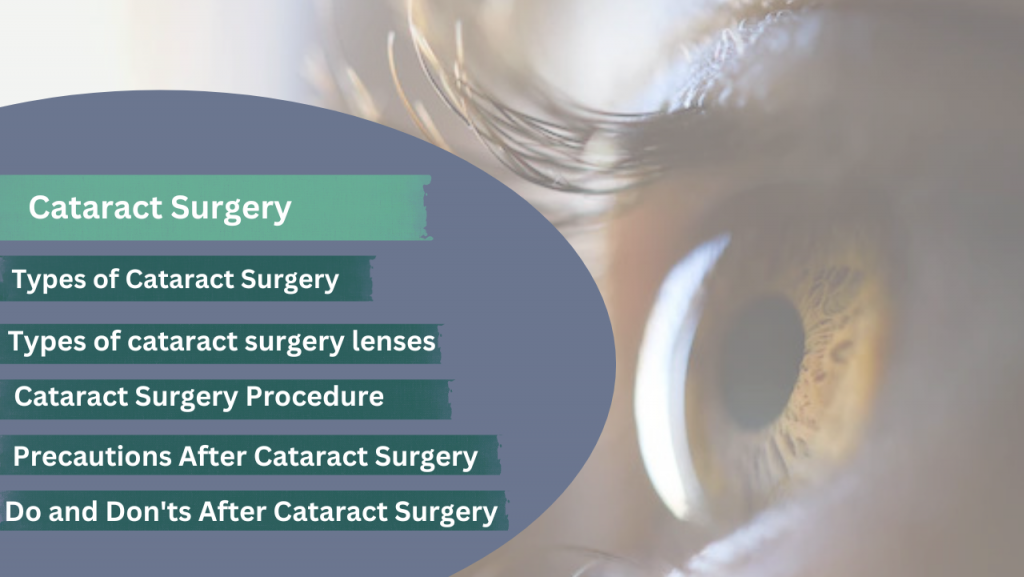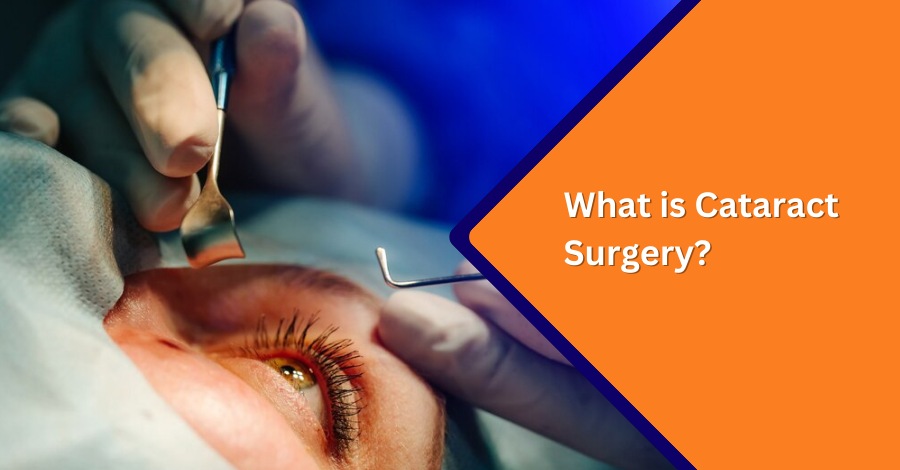Cataract surgery is an operation performed when the natural lens of the eye needs to be replaced with an artificial one. Cataract surgery is common and has helped a lot of patients recover from eye cataracts since time immemorial. Eye cataracts are caused due to the clouding of the natural lenses of the eyes. You must always choose a good ophthalmologist for effective cataract surgery.
While opting for cataract surgery, always select an ophthalmologist who is experienced, highly qualified, and can offer expertise. It will ensure your cataract surgery is done in an effective manner without any issues. You will be easily able to find such an ophthalmologist in a reputable ophthalmology clinic.
This blog post discusses various things you need to know about cataract surgery in great detail. Knowing about these things beforehand will prove very advantageous for you before, during, and after your cataract surgery.
The things about cataract surgery that will be discussed in this article are:
- Types of Cataract Surgery
- Kinds of cataract operation
- Kinds of cataract operation lenses
- Cataract operation process
- Cataract operation recovery period
- Precautions after cataract operation
- Do’s and don’ts after cataract operation
To know about each aspect of cataract surgery in detail, keep reading
Types of Cataract Surgery

Cataract surgery is of various kinds. Your ophthalmologist will prescribe you a specific type of cataract eye surgery based on your age, condition, and a lot of other circumstances. A lot of patients are not informed about the types of cataract lenses. You should be aware of the various kind of cataract eye surgery to know about what makes them different. Knowing this will help you a lot in fully grasping the different kinds of cataract surgeries.
There are many two types of cataract surgeries, phacoemulsification, and Extracapsular surgery. Both have their unique features and needs. Before proceeding to get cataract eye surgery done, you must understand their definitions.
Given below are explanations for phacoemulsification and Extracapsular surgery:
- Phacoemulsification
- Extracapsular surgery
What is Phacoemulsification Surgery?
Phacoemulsification is an operative treatment that involves the use of an ultrasonic instrument to split up the clouded lens in preparation for removal. In the beginning, the ophthalmologist inserts a tiny probe via a tiny incision in the cornea into the lens in which the cataract has developed. This probe uses ultrasonic waves to emulsify or break up the cataract, allowing the surgeon to take it out in little bits.
The capsule of the lens, which is located at the rear of your lens, is kept intact to hold the new artificial lens in position. Incisions of this measurement are typically self-sealing; therefore, sutures are not required.
What is Extracapsular Surgery?
Extracapsular surgery is a less common procedure that takes out the lens as a whole through a bigger incision. The front capsule and the normal lens harboring the cataract will be removed by the eye specialist using surgical instruments. The rear lens capsule is also retained in order to support the newly installed fabricated lens.
When phacoemulsification fails to split up the stiff and developed cataract, this cataract therapy is used. To seal the big incision, stitches are necessary.
Types of cataract surgery lenses
There exist various kinds of cataract surgery lenses. A lot of people are not aware of the different types of cataract surgery lenses, but you must know about their specifications to understand each type. When your doctor suggests particular cataract eye surgery lenses, you will understand what he or she is saying if you know about them beforehand. A lot of patients overlook this fact, and as a result, they end up getting confused when the doctor speaks about these cataract eye surgery lenses. However, you will not have to go through this if you are aware of the different kinds of cataract eye surgery lenses before visiting your doctor.
There are mainly three types of cataract surgery lenses used after the operation. Although there are other types of cataract eye surgery lenses, these are the most common ones. Some of the most prescribed cataract surgery lenses by doctors are mono-focal lenses, multifocal lenses, and Toric lenses. An explanation of these cataract eye surgery lenses is given below:
- Monofocal lenses
- Multifocal lenses
- Toric lenses
These cataract lenses will be prescribed to you if you have any type of refractive error or an unevenly shaped cornea. This can cause hazy vision all throughout, not just full frontal or at a distance. Because this lens reduces astigmatism, you won’t need spectacles to fix it following surgery.
Cataract Surgery Procedure
As a patient, you must fully know about the cataract eye surgery procedure. Before undergoing a cataract eye surgery, knowing about the whole procedure helps you in a lot of ways. One of the benefits of knowing this is that you can prepare for the whole process before undergoing cataract eye surgery.
If patients are aware of the whole procedure before going through a cataract eye operation, they will have no confusion during or after the operation. A lot of patients do not know about these things and are thus not able to fully comprehend the whole procedure of cataract eye surgery.
The whole procedure of cataract eye surgery is explained in the points below, step-by-step:
- Before the procedure
Your doctor will use ointment or a shot to numb the eye. You might also be given medication to assist you in calming down. During the procedure, you will be conscious and will witness brightness and motion. However, you will not be able to observe what the surgeon is doing to your eye. The operation will not be painful.
- During the procedure
To examine your eye, your doctor will use an advanced microscopic instrument. To get to the lens, they make microscopic incisions. The lens is then broken up and removed using ultrasonic waves. Finally, the replacement lens is installed.
- Aftermath
You will not require sutures. The small incisions heal on their own. To safeguard your eye, your physician will place a cover over it.
Cataract Surgery Recovery Time
You might want to know about the cataract surgery recovery time after your operation since you would like to start living your normal activities after the surgery. The good news is that cataract eye surgery does not have a very long recovery time. You would not even have to stay in the hospital after your cataract surgery. However, you should ensure that you follow the precautions which are necessary after cataract surgery to avoid any problems. Generally, you have to follow these precautions for two to three weeks. The following section goes into more detail about the precautions after cataract eye surgery.
Precautions After Cataract Surgery
- About Driving
- About doing physical activity
- About resuming work
After your successful cataract surgery, you might have peace of mind. However, you also need to make sure that your eyes do not face any complications after the cataract surgery. To avoid these complications, you must take certain precautions after cataract surgery.
Several patients who do not take certain precautions after cataract surgery often end up with complications in their eyes. It can feel disheartening, and to avoid getting complications in your eye after cataract surgery, you must not be negligent about the precautions. The precautions after a cataract operation are not very difficult to follow, and thus you won’t face any problems while adhering to them.
If you want to effectively care for your eyes after cataract surgery and ensure the time and money you spend on your operation does not go in vain, always be mindful about following the precautions. These precautions are meant for several aspects of your life, and you must strictly adhere to them.
Do and Don’ts After Cataract Surgery
There are many things you should and should not do after your cataract surgery. These do, and don’ts after cataract surgery are meant for you to be careful about the operation. Never take this advice lightly, and ensure that you follow them to the core.
After your cataract surgery, you must want to go back to your normal life. However, while resuming your daily activities, you must follow the do and don’ts after your cataract operation without fail. Doing otherwise can create problems in your eyes, which is not something you would want after your cataract operation.
Some of the things you should and should not do after your cataract operation are listed below:
Do after your Cataract Surgery:
- After your cataract surgery, your ophthalmologist might have recommended one or more eye drops to you. Take those eye drops at the recommended time and quantity as prescribed by your doctor.
- Relax your body as much as possible after the cataract surgery.
- If your ophthalmologist has prescribed you an eye patch after your cataract surgery, wear it for the duration recommended by him or her.
- Ensure that your eyes do not come in close contact with soap or water after your cataract surgery. It can cause irritation in the eyes, and you need to be careful about it.
- Activities such as watching television, reading books, and walking can be resumed after your cataract surgery. However, ensure that the activities you are getting into are not something intense.
Don’ts After Cataract Surgery
- Avoid dust particles getting in contact with your eye after your cataract surgery, as it can cause complications in your eyes.
- Avoid driving a car or riding a motorcycle for a few days after your cataract surgery.
- Try not to bend after your cataract surgery, as this can have a negative impact on your eye.
- Avoid activities such as swimming and other water sports after your cataract surgery, as you should not let water get into your eyes.
- Do not indulge in physical activities which require significant strength after your cataract surgery. It can unnecessarily put pressure on your eyes.
The bottom line
In this blog post, everything you might need to know about cataract surgery is discussed. Go through each of the sections in this blog post carefully to fully understand all the details.
Always visit a good ophthalmology clinic to get cataract surgery. Doing this will ensure that your cataract surgery is performed with efficiency without any problems.
Note: – This is just for your information, before following the things mentioned in this blog, you must consult your doctors once.

